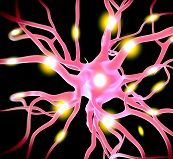Major Depression May Mean Brain's Inflamed
Major depressive episodes (MDEs) have physical symptoms such as anhedonia, anorexia and weight loss-all of which can be triggered by activation of the immune system.In a report in JAMA Psychiatry Elaine Setiawan, PhD and colleagues said their research shows that translocator protein density intensifies during an MDE, and that shows brain inflammation.They measured translocator protein by distribution volume (TSPOVt) assessed through PET scans.

Major depressive episodes (MDEs) have physical symptoms such as anhedonia, anorexia and weight loss—all of which can be triggered by activation of the immune system.
In a report in JAMA Psychiatry Elaine Setiawan, PhD and colleagues said their research shows that translocator protein density intensifies during an MDE, and that shows brain inflammation.
They measured translocator protein by distribution volume (TSPOVt) assessed through PET scans. Their subjects were 20 patients with MDE and 20 healthy controls. They found TSPOVt was significantly elevated in all brain regions in patients with MDE compared to healthy controls. Further, the found the increase in TSPOVt in the anterior cingulate cortex was directly correlated to the severity of the MDE.
That shows it is likely that neuroinflammation in specific regions of the brain may contribute to sickness behaviors that overlap with the symptoms of MDE, they wrote. The finding could indicate a new pathway for therapeutics. “Because TSPO is upregulated in activated microglia, elevated TSPOVt implies that greater microglial activation, a potentially targetable process of neuroinflammation, is present during MDE,” they concluded. Their work also suggests that even though prior studies by others found that peripheral cytokines may cross the blood-brain barrier to induce neuroinflammation and depression “central inflammation may be present during MDE even when peripheral inflammation is absent.”
In forming their hypothesis the team considered earlier studies that found several markers of peripheral inflammation such as levels of C-reactive protein, interleukin 6, and tumor necrosis factor are increased in major depressive disorder. Also, they noted, patients with conditions that create neuro-inflammation, such as traumatic brain injury, lupus, and multiple sclerosis are prone to have MDEs.
That suggests a link between brain inflammation and mood symptoms.
They had expected to find evidence of brain inflammation in post mortems of suicide victims, but did not—likely because of problems with study designs and other factors, they wrote.